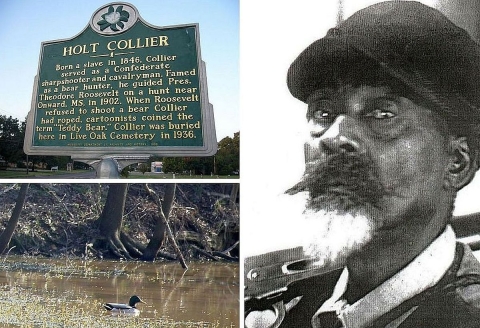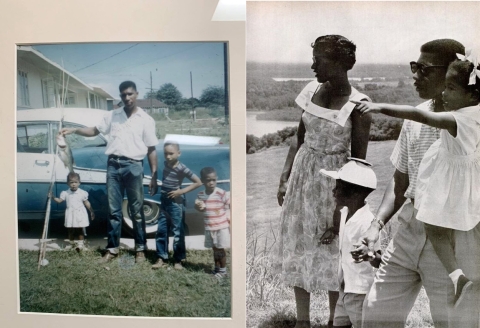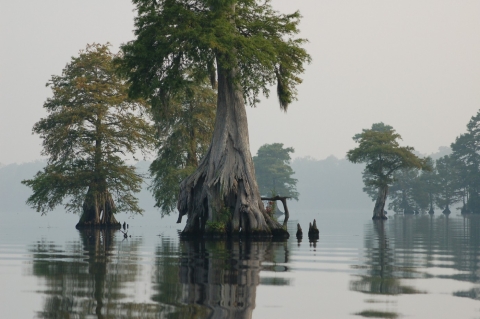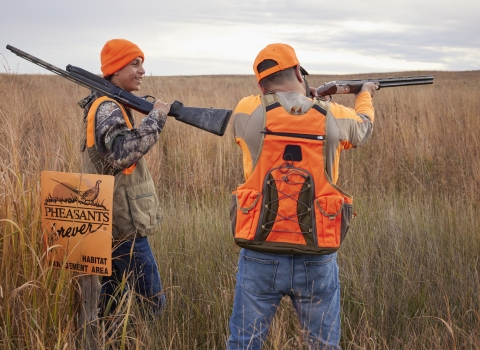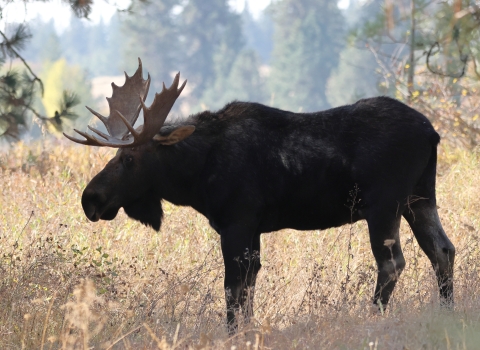The U.S. Fish and Wildlife Service is partnering with the National Park Service to share the experiences of members of the Civil Rights Movement and African American and Black leaders enjoying and finding well-being in the outdoors. The Nature That Nurtures projectwas introduced on social media during Black and African American History Month in February 2022.
Through photographs and historical accounts, the emerging project reveals a more personal side to Medgar Evers, Holt Collier, Fannie Lou Hamer, and others. The series will connect their experiences to opportunities that everyone can enjoy on public lands.
Holt Collier
Holt Collier, born into slavery, was a Confederate sharpshooter, calvaryman, and spy during the Civil War. He returned home to Mississippi and became a respected outdoorsman and expert in tracking game. In 1902, Collier was called upon to guide a bear hunt for President Theodore Roosevelt.
During the hunt, Collier skillfully drove a bear to Roosevelt’s hunting blind to offer a clear shot. The timing was off, however, and Collier restrained the bear to protect others on his team. Roosevelt, like any hunter with honor, refused to shoot the tied-up bear. Word spread about the story, captured in national editorial cartoons, and an enterprising New York store owner created “Teddy’s Bear,” the first stuffed toy bear.
The 1902 bear hunt was the start of a lifelong association between Holt Collier and President Roosevelt.
Collier died in 1936 at the age of 90 and is buried in Mississippi near where he killed his first bear and a short drive from Holt Collier National Wildlife Refuge, named in his honor.
Medgar Evers
Medgar Evers is a well-known Civil Rights Movement leader who had a passion for fishing.
Evers, the first Mississippi field secretary for the National Association for the Advancement of Colored People (NAACP), grew up angling in local ponds and streams.
He and his family were no different than millions of people who visit public lands to reflect and recreate.
Evers was shot to death in the driveway of his carport in June 1963. In 2020, their Mississippi home became the Medgar and Myrlie Evers Home National Monument.
Fannie Lou Hamer
Fannie Lou Hamer rose from humble beginnings in the Mississippi Delta to become one of the most powerful voices of the civil and voting rights movements. She had a passion for digging in the dirt.
After one of Hamer’s adopted daughters died from anemia and malnutrition at the young age of 22, she created the Freedom Farm Cooperative in 1967. The farms produced kale, green beans, peas, butter beans, collards, and turnips. Even though the federal government had begun the Food Stamps program, it was Hamer’s belief that it’s everyone’s duty to feed the hungry. She was among the first to advocate for food security as a civil right.
Hamer found great joy in taking walks outside with her husband and friends. If you’d like to take a healing hike near her Mississippi Delta home, visit the trails at the Northern Mississippi Refuges Complex.
Booker T. Washington
Booker T. Washington (left in the fishing boat), a prominent African American educator and orator, came to fishing later in life.
Fishing and healthy living restored Booker T. Washington’s health with medical care from William P. Crayton. There are opportunities to enjoy the outdoors near his home in Alabama at Eufaula and Cahaba River National Wildlife Refuges.
Refuges
African American history is embedded in the fabric of national wildlife refuges and national fish hatcheries. Among the many on a refuge-based African American history tour:
- The site of a historic settlement at Great Dismal Swamp National Wildlife Refuge (above: cypress trees at Great Dismal Swamp) in Virginia where, for generations, people who escaped from slavery defied bounty hunters
- The birthplace of Harriet Tubman at what is now Blackwater National Wildlife Refuge in Maryland
- One of the best-protected Gullah communities at Waccamaw National Wildlife Refuge in South Carolina
- Bombay Hook National Wildlife Refuge in Delaware, where an all-African American Civilian Conservation Corps - or CCC - crew worked
For more information about Nature That Nurtures and the Service, contact Terri Edwards, writer/editor, or Mark Madison, historian. Former Service employee Keena Graham is the lead for this project with the National Park Service, where she now serves as the superintendent of the Medgar and Myrlie Evers Home National Monument.

